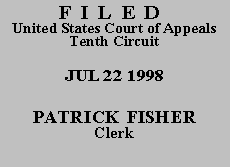

| NANCY R. MACK,
Plaintiff-Appellant, v. KENNETH S. APFEL, Commissioner, Social Security Administration, Defendant-Appellee. |
|
Claimant Nancy R. Mack appeals the district court's order(1) affirming the Commissioner's decision to deny her application for social security disability benefits. She alleges disability since January 8, 1993 due to depression, panic disorder and heart problems. Following an administrative hearing, the Commissioner determined at step four of the five-step analysis, see Williams v. Bowen, 844 F.2d 748, 750-52 (10th Cir. 1988) (discussing five steps), that claimant could perform a full range of sedentary work, including her past relevant work as an accounts receivable clerk or billing clerk. Because the agency's findings are inadequate to evaluate whether substantial evidence supports the denial of benefits, we remand for further findings.
We review the Commissioner's decision to determine whether it is supported by substantial evidence and whether correct legal standards were applied. See Hawkins v. Chater, 113 F.3d 1162, 1164 (10th Cir. 1997). "Substantial evidence is 'such relevant evidence as a reasonable mind might accept as adequate to support a conclusion.'" Soliz v. Chater, 82 F.3d 373, 375 (10th Cir. 1996) (quoting Richardson v. Perales, 402 U.S. 389, 401 (1971)) (further quotation omitted).
On appeal, claimant alleges that the Commissioner failed to consider the effects of her depression and panic disorder on her ability to perform her past relevant work. A severe mental impairment is a nonexertional impairment which must be evaluated to determine if the claimant can engage in substantial gainful work activity. See Cruse v. United States Dep't of Health & Human Servs., 49 F.3d 614, 619 (10th Cir. 1995).
In addressing her panic disorder, the Administrative Law Judge (ALJ) stated that it had fluctuated over time and the medical reports indicated that she was able to function fully. See R. Vol. II at 17. These findings are insufficient for us to determine whether the ALJ considered the medical evidence that claimant's panic disorder was untreated as of November 16, 1994, see R. Vol. II at 253, see also id. at 241-43, and that it interfered with her daily functioning, see id. at 237. Moreover, contrary to the ALJ's finding, most of the medical reports do not address the question of whether claimant can function despite her mental impairments. In addition, the ALJ did not address claimant's depression. Therefore, on remand, the ALJ should make additional findings to support his conclusion that claimant's panic disorder did not affect her ability to work, and make findings on the effect, if any, of claimant's depression on her ability to work.
The ALJ's decision indicated that he considered claimant's allegations of "pain and other limitations," id. at 16, but did not explain why the evidence led him to find not credible claimant's allegations that her mental impairments adversely affected her ability to work. The ALJ apparently determined that claimant's subjective complaints were not credible, but he failed to link that finding to the specific evidence. See Kepler v. Chater, 68 F.3d 387, 391 (10th Cir. 1995) (ALJ listed factors to be considered in evaluating claimant's nonexertional impairments, but "did not explain why the specific evidence relevant to each factor led him to conclude claimant's subjective complaints were not credible"). The ALJ's "'findings as to credibility should be closely and affirmatively linked to substantial evidence and not just a conclusion in the guise of findings.'" Id. (quoting Huston v. Bowen, 838 F.2d 1125, 1133 (10th Cir. 1988)). On remand, the ALJ should link his credibility findings to substantial evidence in the record.
If, on remand, the ALJ determines that claimant's mental impairments adversely affect her ability to work, then he should make findings on the mental demands of her past work, and compare the mental demands of her prior work with her capabilities. See Cruse, 49 F.3d at 619 (reversing due to ALJ's failure to consider effect of claimant's mental impairments on her ability to work); Henrie v. United States Dep't of Health & Human Servs., 13 F.3d 359, 361 (10th Cir. 1993) (remanding to develop a record on claimant's ability to perform past work considering her psychological impairments).
To the extent the ALJ found claimant not disabled because she discontinued counseling for her mental impairments, on remand the ALJ should explore the reasons claimant did not continue to receive counseling. See Teter v. Heckler, 775 F.2d 1104, 1107 (10th Cir. 1985) (identifying four elements to consider when evaluating whether claimant's failure to undertake treatment will preclude a finding of disability). If the ALJ determines claimant's decision not to receive counseling contributes to a conclusion that she is not disabled within the meaning of the Social Security Act, then he should make findings adequate to support his conclusion.
The district court's order is REVERSED and REMANDED, with instructions to remand the case to the Commissioner for additional findings on claimant's mental impairments consistent with this order and judgment, and for any further proceedings the ALJ finds necessary.
Entered for the Court
Circuit Judge
*. This order and judgment is not binding precedent, except under the doctrines of law of the case, res judicata, and collateral estoppel. The court generally disfavors the citation of orders and judgments; nevertheless, an order and judgment may be cited under the terms and conditions of 10th Cir. R. 36.3.
1. The parties consented to proceed before a magistrate judge. See 28 U.S.C. § 636(c).